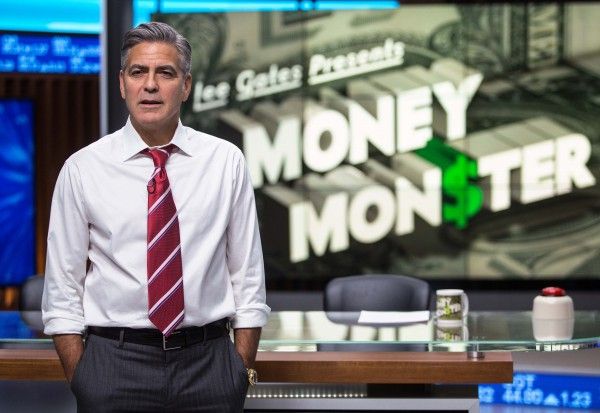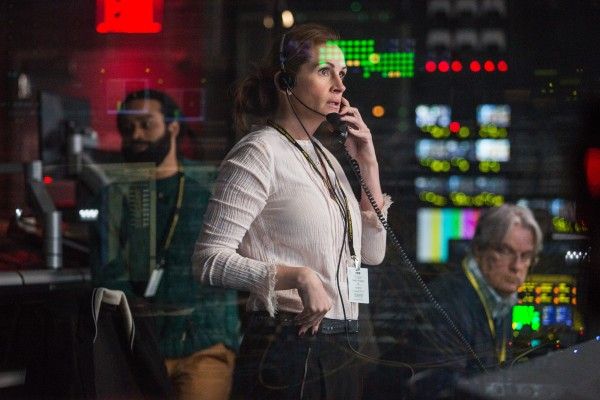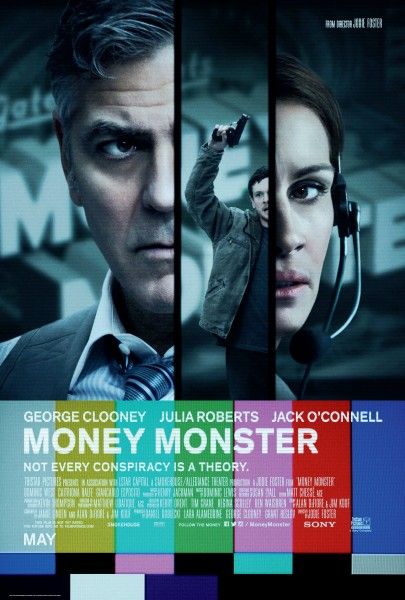A film like Money Monster serves to remind me of the skill and craft that went into the far superior The Big Short. Both films use the financial crash as a springboard, but whereas The Big Short wants you to understand what happened and then use that understanding as your emotional investment, Money Monster skips straight to the outrage. However, there aren’t any answers in outrage, and while director Jodie Foster gets some strong performances out of her excellent cast, her film is remarkably short on tension despite following a hostage crisis motivated by financial ruin.
Lee Gates (George Clooney) is the host of a popular financial program called “Money Monster”, and he’s lovably unbearable to his staff and especially the show’s director, Patty Fenn (Julia Roberts). The day’s top story is the crash of IBIS, a financial firm that recently lost $800 million, which they claim is due to a glitch in their algorithm. Lee is due to have the company’s CEO Walt Camby (Dominic West) on but Camby is nowhere to be found. Instead, crazed gunman Kyle Budwell (Jack O'Connell) sneaks on to set and takes Lee and the show hostage with a gun and a bomb wired to a vest, which he puts on Lee. Kyle demands answers to why he lost everything in the IBIS crash and Lee and Patty try to find a way to stall for answers and maybe, with a gun literally pointed at their heads, do journalism instead of entertainment.
Money Monster has a collection of good ideas for a starting point, but never knows how to develop them further. The financial crash presents a wealth of interesting topics, but the movie doesn’t know how to contribute to the conversation beyond shouting, “I too am angry!” It’s sympathetic and yet rarely seems to have an understanding of what’s is sympathizing with. The movie is ripping from the headlines, but didn’t seem to read the article. Foster had a prime opportunity to seize on the media’s complicity in the financial crash, but instead she wants to shift the blame over to isolated incidents and conspiracy theories.
This leads to a film that has a lot of intensity, and nowhere to put it. We get wrapped up in the immediate stakes, but can’t shake the feeling that there won’t be a bigger payoff because there’s no larger investment. What we invest is because of the tremendous performances from the lead actors. Clooney remains charm incarnate and oddly relatable despite being the handsome, callow host of a cancerous TV program. Roberts is fierce and fiery as Patty, and she gives the film its capable center. And O’Connell continues to be an actor in search of a breakthrough role. His performance here is so good where he switches between loathsomely dangerous and incredibly sympathetic without missing a beat. Fans of his past work won’t be surprised of how good he is here and hopefully he wins over some new converts.
The strength of these performances actually takes the subtext of Money Monster and puts it someplace unexpected: strong women trying to clean up after childish men. It’s not where a hostage drama naturally goes, but that’s how Foster sets up her characters with Patty trying to work through Lee, Kyle getting berated by his girlfriend Molly (Emily Meade), and Camby being investigated by his Chief Communications Officer, Diane Lester (Caitriona Balfe). The sympathies of the film lay with these three women, and when viewed through this lens, Money Monster is a modestly interesting portrait of women tackling a crisis.
Unfortunately, the crisis at the forefront never seems to be fully understood or reckoned with, so while the movie can throw out phases like Matt Taibbi’s “great vampire squid” or point to our obsession with media spectacle, nothing in Money Monster digs deeper. It has no answers and its critiques are obvious. While the performances make it a captivating experience, Money Monster could have been worth so much more.
Rating: C+




